Search the Special Collections and Archives Portal
Search Results
Hughes H-1 Racer, Newark, New Jersey, 1937 January 19
Level of Description
File
Archival Collection
Howard Hughes Public Relations Photograph Collection
To request this item in person:
Collection Number: PH-00373
Collection Name: Howard Hughes Public Relations Photograph Collection
Box/Folder: Folder 02
Collection Name: Howard Hughes Public Relations Photograph Collection
Box/Folder: Folder 02
Archival Component
Hughes H-1 Racer, Newark, New Jersey, 1937 January 19
Level of Description
File
Archival Collection
Howard Hughes Public Relations Photograph Collection
To request this item in person:
Collection Number: PH-00373
Collection Name: Howard Hughes Public Relations Photograph Collection
Box/Folder: Folder 02
Collection Name: Howard Hughes Public Relations Photograph Collection
Box/Folder: Folder 02
Archival Component
Hughes H-1 Racer, Newark, New Jersey, 1937 January 19
Level of Description
File
Archival Collection
Howard Hughes Public Relations Photograph Collection
To request this item in person:
Collection Number: PH-00373
Collection Name: Howard Hughes Public Relations Photograph Collection
Box/Folder: Folder 02
Collection Name: Howard Hughes Public Relations Photograph Collection
Box/Folder: Folder 02
Archival Component
Hughes H-1 Racer, Newark, New Jersey, 1937 January 19
Level of Description
File
Archival Collection
Howard Hughes Public Relations Photograph Collection
To request this item in person:
Collection Number: PH-00373
Collection Name: Howard Hughes Public Relations Photograph Collection
Box/Folder: Folder 02
Collection Name: Howard Hughes Public Relations Photograph Collection
Box/Folder: Folder 02
Archival Component
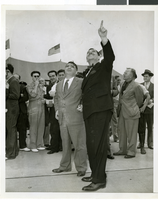
Photograph a crowd awaiting watching Howard Hughes land, New York, July 14, 2013
Date
1938-07-14
Archival Collection
Description
The black and white view Mayor Laguardia and Grover Whelen watched Howard Hughes land in his Lockheed 14 aircraft at Floyd Bennett Field, New York. Typed onto a piece of paper attached to the image: "Mayor Laguardia (left) and Grover Whelen looking skyward as they see the approaching Howard Hughes and his globe girdlers complete A Round The World flight, 7-24-38. (Press Association)."
Image
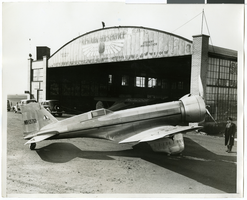
Photograph of Howard Hughes' Northrop Gamma Racer in Newark, New Jersey, January 14, 1936
Date
1936-01-04
Archival Collection
Description
A view of the side of Howard Hughes' Northrop Gamma Racer.
Image
Howard Hughes standing in the doorway of his plane at the Grand Central Air Terminal in Los Angeles, 1938
Level of Description
File
Archival Collection
Howard Hughes Public Relations Photograph Collection
To request this item in person:
Collection Number: PH-00373
Collection Name: Howard Hughes Public Relations Photograph Collection
Box/Folder: Folder 15
Collection Name: Howard Hughes Public Relations Photograph Collection
Box/Folder: Folder 15
Archival Component
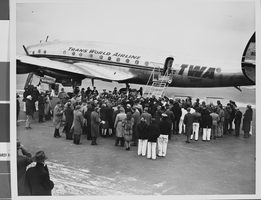
Photograph of Trans World Airline flight, New York, February 15, 1946
Date
1943 to 1945
Archival Collection
Description
Description given with photo: "Non-Stop Los Angeles - New York Flight Inaugurated New York -- View of the crowd around the "Star of California" waiting for passengers -- most of them after it landed at LaGuardia Airport Feb. 15. Piloted by Howard Hughes, famed Around-The-World record holder and a TWA executive, the flight in-augurated non-stop schedule between Los Angeles and New York. The TWA Constellation made the trip in 8 hours and 38 minutes, as compared with the record of 7 hours, 27 minutes. Credit (ACME) 2/15/46."
Image
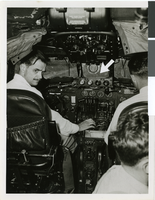
Photographs for press release, Hughes demonstrates new radar warning, May 1, 1947
Date
1947-05-01
Archival Collection
Description
Photographs that accompany the attached press release: "HUGHES DEMONSTRATES NEW RADAR WARNING Howard Hughes, at the controls of the TWA Constellation, demonstrates the efficiency of his new radar safety device, which is being installed on all TWA planes and which will be available to all other airlines in the United States as soon as he can produce the equipment. The instrument warns the pilot by a brilliant red light and a warning horn the instant the plane comes too close to the ground, or any building, bridge, mountain, aircraft or other obstacle, regardless of darkness or weather conditions. The device weighs only 16 pounds and costs about $130. (Arrow points to warning lights on instrument panel). Center photo shows the Hughes-piloted Constellation approaching a mountain in Southern California's Santa Monica Range, an area usually voided by pilots because of its dangerous peaks. This particular plane's radar set was equipped with both 500-feet and 2,000-feet warning signals. The 500-feet warning range now being installed on TWA airliners was developed first because the greatest immediate need for it is during approaches and landings. The 2,000-feet warning is designed from enroute flying to guarantee clearance of mountains and other obstacles. Photo at right shows the Constellation veering to the left and climbing at a speed of 300 miles an hour after receiving radar warning of an obstacle in its flight path."
Image
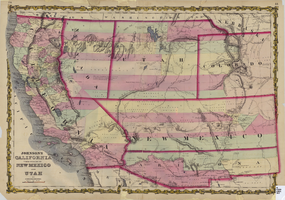
Map of California and territories of New Mexico and Utah, circa 1861
Date
1856 to 1866
Description
40 x 60 cm. Relief shown by hachures and spot heights. Prime meridians: Greenwich and Washington. Atlas plate numbers 54 and 55 in the upper corners. Shows forts, trails, exploration routes, drainage, mail steamship routes, physical features, Indian tribes, and historic sites. The geographic region of Southwest is referred to as the New Southwest. Original publisher: Johnson .
Image
Pagination
Refine my results
Content Type
Creator or Contributor
Subject
Archival Collection
Digital Project
Resource Type
Year
Material Type
Place
Language
Records Classification
